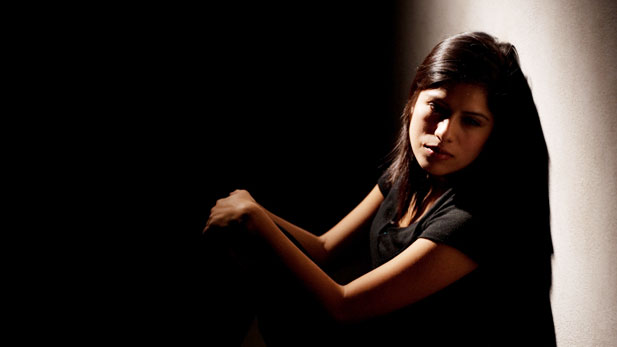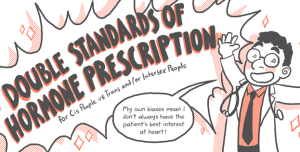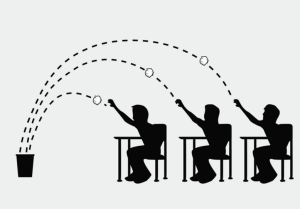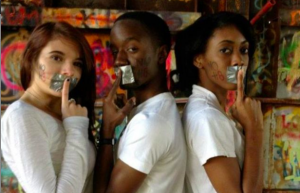Originally published on Being Feminist and cross-posted here with their permission.

Credit: Latino Healthy Zone.
(Trigger Warning)
I was eighteen years and four months old, so officially already an adult woman. It was the summer holidays before the start of university and independence. We’d all got our A Level results and were sorting out university places and someone at school had a big party in a church hall, a present from her parents for doing well in her A Levels and being eighteen, I wore my new dress of blue velvet, the possession of which I felt, placed me in the realms of the cool people.
Early on in the evening, I was talking to a friend when a boy came up to me and kissed me. I say boy, I suppose I mean man, but I still thought of male peers as boys. (He was 19 by the way.) Without warning, without comment, he just grabbed me, held me close around him so I couldn’t move and thrust his tongue into my mouth and kissed me.
I found this repulsive and startling, yet Bohemian, exciting and off the wall. I had no idea who this guy was, had never seen him before in my life, knew immediately that I didn’t fancy him, but it didn’t even cross my mind to question his right to simply overstep any normal boundaries.
It was a party. Men were supposed to behave like that, as far as I knew. It would have been uptight, prudish, strait-laced, to object. No-one had told me that only rapey men behave like that, normal men who fancy you but don’t have a sense of entitlement, don’t just grab you in that way.
I ran off giggling with my friend, who was slightly perturbed by his behaviour and with hindsight, probably by my reaction. “He was wierd”, but I was too excited and naievely flattered that I’d notched up an “I’ve got off with someone” mark so early in the evening.
It meant that a man had noticed me and that was something to strive for, wasn’t it – it’s what women are socialised to do – strive for positive male attention. It meant I could be in that group on Monday morning, who had got off with someone on Saturday night. I’d never been in that group before, I felt like I’d arrived.
I’d grown up in a family where my personal boundaries, privacy, self-determination, had never been respected, so I didn’t find it as much of an intrusion as my friend did.
For the rest of the party though, I deliberately avoided him because although his behaviour had given me access to the cool group, I didn’t fancy him and found him pretty repulsive and didn’t really want to repeat the experience of the kiss. I occasionally saw him watching me, intently, and I saw nothing sinister about it.
I had no suspicions, no sixth sense, no spidey feeling that warned me that this man was a sexual predator. How could I have? I grew up in a society where the Impulse ad was on the telly- a man grabs a woman at a station and snogs her and no-one calls that sexual assault, they said that “Men just can’t help acting on Impulse”. That was the slogan.
So when a man did that to me at a party, I didn’t think it was a sexual assault, I just thought it was some unattractive chancer who was behaving normally. The whole of my culture and upbringing, told me that.
Besides, I found out he was the brother of someone in my class, someone I fancied to be honest; someone I was rather hoping to get off with at some point, but I figured that this bloke might have ruined that for me tonight. People’s brothers were OK, you didn’t need to worry about them.
It took me years to realise that that kiss, had been a set-up: that the reason he had targeted me in that way, was to ensure that later on, if I complained about being raped, he could point to that and have lots of witnesses saying that we’d been seen kissing earlier on at the party.
That way, he could be absolutely sure that he’d get away with it, because as everyone knows, once a woman kisses a man, he then has the right to penetrate her body whether she wants him to or not. I heard later on, that he’d kissed another girl in exactly the same way. So he set two of us up, but she was the one who got away.
When a bunch of us left in a big group to walk down to the cab office, he was in that group. As we walked along he sidled up to me and started talking. I talked back out of politeness.
Women are socialised to be polite, to respond to men’s conversational overtures, even where earlier on they may have over-stepped a mark, we’re supposed to put it behind us and move on and not think anything of it. So that’s what I did. I conformed to normal behaviour and talked normally to him.
Without really knowing how it happened, I realised we were somehow falling behind the rest of the group. At first it didn’t worry me. They were in sight, it’s just that we were far behind them now.
At one point I said something about it and tried to catch up with them, but he pulled me back. It was at that point that I suppose the victim-blamers will say that I should have screamed, shouted, cried for help.
Because it was at that point I should have realised he was planning to rape me.
But I didn’t.
Because I was also taught, that to assume that a man is a rapist just because he’s stopping you doing something you are showing clearly that you want to do, is hysterical, man-hating, hairy-pitted feminism which is a Bad Thing.
And so once again, his boundary-breaking behaviour, didn’t really bother or alarm me as I didn’t perceive it as boundary-breaking, I perceived it as normal.
Women’s boundaries are constantly being broken by men and we are told all the time, that if we make a fuss about it, we are unreasonable, unfriendly, rude, hysterical, difficult, confrontational – all negatives, all things we should strive not to be.
So if you are young and have never been raped and don’t know how common it is and you know that your boundaries are supposed to be broken because that’s what society has told you, you don’t feel alarm when a man breaks them yet again. In my case, I felt slight irritation, but nothing more.
When he pulled me back, he drew me into a doorway and started to kiss me. I resigned myself to the prospect of having to snog him for a bit before going to get my cab, because it didn’t occur to me to knee him in the balls and run away screaming from him, as some will say I should have done at that point.
If I had done, doubtless I would have been accused of hysterical over-reaction, but seeing as how he was bigger and stronger than me, that wasn’t an option anyway. Every now and then, we carried on walking and he would draw me into another doorway and kiss me some more. Little by little, we were getting closer to the cab office.
One little doorway turned out to have a little alley way next to it. Before I’d even noticed it, he was pulling me down the alley, laughing conspiratorially as if this was my idea too, drawing me into his “naughtiness”.
Even then, I didn’t feel threatened. Even then, I didn’t expect this man to rape me. Why would I? He was someone’s brother, not a rapist in a dark alley… oops.
Right up until the moment he actually pulled my knickers down and I felt his penis, I genuinely had no idea he would actually rape me. Even as he entered my body, my main emotion was utter incredulity.
I simply couldn’t believe this was happening. This repulsive man had somehow separated me from my friends, dragged me down an alley and was raping me.
And I’d bloody co-operated, I hadn’t made a fuss, I’d gone along with it, I’d just let him do it. I felt total disbelief. And I felt bloody stupid.
Like so many rape victims, I blamed myself for not spotting that he was a rapist and extricating myself from his rape, instead of blaming him for being a rapist.
I lay there and waited for him to finish, hoping it would be quick so that I could get home.
Afterwards, he asked me if I was OK and then asked for my phone number. I gave him it, too stunned to know what else to do. He then walked me to the cab office, “so that I’d be safe” (!) and said he’d call me.
All the way home, I thought about whether I’d been raped or not and like many rape victims, convinced myself I hadn’t been. I felt like I had, but I told myself what society would have told me – that I was wrong and unreasonable to feel that way, I hadn’t said no, or at least, if I had, I hadn’t said it strongly enough, aggressively enough, I hadn’t fought him off, I hadn’t resisted being pulled down the alley, I hadn’t resisted at all.
Except that I had resisted, just not in a way that society defines resistance. Society has allowed rapists to define what resistance is: screaming, crying, scratching, pushing, kicking, biting, punching.
I didn’t resist like that. My resistance was to wriggle a bit, turn my head away when he tried to kiss me, try to stop his hand going into my bra and knickers, push him ineffectually, talk about wanting to get my cab; all things which normal men recognise as not being enthusiastic participation when they are engaging with women but pretend it’s a grey area when they talk about rape.
Rapists have managed to get society to believe, that what I did, was consent. Because I didn’t resist in the way rapists – and society – say that women should resist, they define our non-participation as consent. (More about why consent has been constructed to enable rapists to get away with rape here)
I hadn’t treated him the way society says women treat rapists, I’d treated him the way many women actually treat rapists – like a bit of a nuisance who have to be tolerated for a bit.
I’d been socialised to believe that you just had to put up with men touching you when you didn’t want them to. The one time I’d seen a woman react furiously to such treatment, everyone laughed at her and said how over the top she was and how unreasonable when he didn’t mean anything by it.
So I’d absorbed the message, that to treat a man who was acting like a rapist as if he were a rapist – the way society tell us to – was to be an hysterical, unreasonable bitch and you lose approval ratings if you’re one of those, don’t you, so like most young women, I’d buckled down to that message.
It’s what women do.
And then society tells us that it’s our fault we were raped, because we didn’t do the thing they call us hysterical bitches for, when we do do it. I didn’t act like the unreasonable bitch everyone had laughed at when he first overstepped my boundaries, so it was my fault he raped me.
And besides, I had had a couple of beers (although I wasn’t drunk) and I was wearing a short, skin-tight blue velvet dress. The blue velvet dress which had marked me out as belonging to the cool crowd, also marked me out as the sort of woman who doesn’t have the right to “cry rape” when she’s raped.
The police would just tell me it was my fault. My friend had been raped when she was 14 and they’d told her to go away and stop wasting their time. She had been legally a child and I was legally a woman and she’d been dragged into a park by a stranger – the classic, rare, stranger rape, not someone who was someone’s brother and therefore couldn’t possibly be a rapist.
And even then, they weren’t remotely interested in catching the man who raped her or investigating the case at all. So I knew there was absolutely no chance, that the enforcers of the law, would be remotely interested in enforcing it in the case of a grown adult in a blue velvet dress.
I even felt guilty about allowing the thought that I’d been raped, to cross my mind. Like most of us, I’d absorbed the lie that women “cry rape” (that phrase that means women habitually make false allegations about rape) and that there are millions of wronged innnocent men walking around having had their lives ruined by hysterical, man-hating women who imagined that they’d been raped because they’re so stupid, or deliberately lied about it out of pure, unbridled malice.
The horror that I might be one of those women, made me feel pity for my rapist and shame that I could even think such a thing about the poor man. I had no pity for my eighteen year old optimistic, rational, honest self; society had brain-washed me so effectively, that all my empathy was for him, none for me.
When he called me two days after the rape to ask me out, I said yes immediately. Mainly because I was afraid that if I didn’t go out with him now, he would tell everyone what a slag I was, fucking him in an alleyway, but also because if I went out with him and was his girlfriend, then that meant it couldn’t be rape, it would all be OK and I would stop feeling as though I had no control whatsoever about what happened to me with sex.
I wanted to have sex with him in a normal way; in a bed, with me having some choice over it. It would mean that he hadn’t raped me.
It would make that Saturday night OK, the beginning of a romance, not what it still felt like – an attack on my autonomy.
I found him utterly repulsive, boring to be with and I couldn’t wait to get away from him, but I went out with him for 3 weeks to make it respectable and all OK in my mind and then I told him it wasn’t working out for me and I thought we should stop seeing each other.
When we parted, he kissed me, put his hands down my knickers again, just to show me that he could, and said to me “have a great time at university and don’t sleep with anyone you don’t want to”. When I assured him I wouldn’t, he said: “you already have”.
I couldn’t believe what he was telling me. He was telling me, that he was a rapist. That he knew he was a rapist. That my three weeks of boredom and bad sex with him, had been wasted.
It hadn’t been him being a bit drunk, not understanding my ineffectual wriggling away, not realising I didn’t want to have sex with him; he knew it wasn’t the “grey area” of rape myth.
I was so startled that my immediate response was to deny what he said. ”I haven’t – I never have”. He smiled. ”Yes, you have.”
Again it took me twenty years to realise what he was doing there. He was taking away any semblance of control or dignity I had. He wasn’t willing to allow me the pretence that it had all been a big misunderstanding, that I’d tried to go out with him afterwards and see how we got on but it hadn’t worked out.
He wanted me to know exactly what he’d done and that he’d got away with it with my connivance and there wasn’t a single thing I could do about it.
It took me twenty years to face up to that. In those twenty years, my immediate response to him raping me, was to leave me with a fatalistic attitude to sex.
I felt totally unable to set any boundaries. I felt scared to tell a man I didn’t want to have sex with him just now, or just here, or like that, because I couldn’t take the risk that my wishes would be over-ruled again and I would have to face the fact that I’d once more been forced to have sex I didn’t want and that would prove that I was one of those women who were somehow designed for men to use and exploit, not like normal women.
So I had lots of sex I didn’t want, with men I didn’t like, who didn’t force me to have it but who didn’t much care if I wanted it or not, to prove to myself that an unwanted fuck was no big deal and not worth getting upset about. I went through phases of celibacy lasting years followed by phases of one night stands with men who were of no interest to me whatsoever.
I suppose it’s fair to say that it pretty much ensured, that I had a totally screwed up attitude to sex without realising that that’s what I had.
All that time, I only once tried to tell someone that I’d been raped. Two friends at university. I read an article about date rape, which presented the revolutionary concept that rapists aren’t necessarily men in balaclavas with knives in dark alleys, they’re just men who make you have sex you don’t want to have.
This revelation shook me so much, that I told a couple of friends about what had happened to me, but both of them suggested that I write him a letter saying how I felt – their primary concern was to ensure that I didn’t call it rape, because obviously it couldn’t be (like most women, it was more important to them to protect a man they’d never met from being called a rapist when he was one, than it was to acknowlege the rape of a woman who was a friend), it was just a misunderstanding (I had blocked out his parting shot so hadn’t told them about that) and that he would want to reassure me that he hadn’t meant to seem rapey, it had all been a big misunderstanding and then I’d feel better.
I did think of doing that, but something told me that he’d get off on a letter like that, so I left it and never told anyone else about it for another couple of decades.
Like most rape victims, I was effectively silenced. What silenced me most, was the dread of not being believed. The knowledge that I would be asked: “but why didn’t you shout?” “why did you let him separate you from your friends?” “why didn’t you tell him to stop kissing you and to go straight to the cab office?” “why did you give him your phone number?” “why did you go out with him afterwards – even sleep with him afterwards?” “why didn’t you tell your friends what had happened?”
All the questions I asked myself for a couple of decades. Even now as I wrote this, You, Dear Reader, will note what care I have taken to try and explain my behaviour, to pre-empt the questions and criticisms and scepticism.
To do what rape victims are always required to do and rapists rarely are: to account for my behaviour, to explain why I became a rape victim. The explanation: “because I was unlucky enough to meet a rapist” will not do, I know.
Society doesn’t want to blame men for making the choice to rape women, it wants to blame women for enabling men to make that choice and usually it succeeds. Rapists very rarely get to accept responsiblity for their choice to rape, even rape victims blame themselves for their rapist’s choice to rape them. .
I’m done with accepting that blame. It was not my fault. I didn’t do anything to make him do it.
My fabulous blue velvet dress was not responsible. The fact that I’d had a couple of beers was not responsible. Even my abusive childhood, with its failure to inculcate self-esteem, was not responsible.
Because I went out with him afterwards and had what society calls consensual sex with him a couple of times, doesn’t mean it wasn’t rape that one time.
Because I didn’t behave the way rape victims are supposed to behave (more on the image of rape survivors/ victims) doesn’t mean it wasn’t rape.
Because I spent between two or three decades feeling unable to tell anyone in case they wouldn’t believe me, doesn’t mean it wasn’t rape.
It was rape, he is a rapist and I am a rape survivor.
And the fact that neither of us behaved the way society says rapists and rape victims behave, doesn’t mean it wasn’t rape.
It just means that society has got to stop misinforming the public, about what rape is. Society keeps selling us the version of rape that rapists have invented: the one which enables them to carry on raping women and know that they will get away with it.
We keep on making excuses for rapists, convincing their victims that they have no right to call it what it is.
For years I blamed myself for dating him afterwards, knowing I hated him and found him repulsive. I could never understand, why I’d done that to myself, why I’d thought it so necessary. Why had I punished myself like that?
I blamed myself for handing him power over me, the power to penetrate my body again when he knew I didn’t want him to, the power to pretend that he wasn’t a rapist, because his victim had gone back for more.
Now, I blame the society which convinced an intelligent, popular teenager, that the only way to make rape OK, would be to date her rapist. It’s nearly 30 years since that happened to me and society is still blaming women for rape, instead of blaming men.
My daughter is facing the same dangers I faced: a 25% likelihood that she will be raped or sexually assaulted in her lifetime. If that does happen to her, like her mother, she’s statistically unlikely to report it – only 10-15% of rape victims file a report. If she does, she’s got only a 6% chance of seeing her rapist found guilty in a court of law.
When it comes to rape, not much has changed for women in nearly three decades. I guess all I can do for her, is to raise her to expect her boundaries to be respected, to make her aware of how common rape is and to let her know that if she does get raped, it won’t be because of anything she says or does or wears, it will be purely and simply because she has the bad luck to meet a rapist.
And for all the other girls and women out there, all I can do is speak out about my own experience and raise my son to know that if he is not sure a girl or woman wants him to carry on doing whatever it is he’s doing, then he needs to ask her and respect her answer, because if he doesn’t, then he may be a rapist.
Because rapists aren’t usually scarey men in dark alleys, they’re someone’s son, brother, father, uncle, cousin, friend, colleague. Somewhere out there, the man who raped me is probably raising a family and living a normal life, like most other rapists.
And he’s probably still pretending that he’s not a rapist and society is still supporting him in that.
And that’s how I became a rape victim. Thanks for reading.
Search our 3000+ articles!
Read our articles about:
Our online racial justice training
Used by hundreds of universities, non-profits, and businesses.
Click to learn more




















